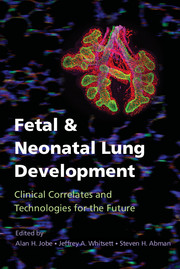Book contents
- Fetal and Neonatal Lung Development
- Lung Growth, Development, and Disease
- Fetal and Neonatal Lung Development
- Copyright page
- Contents
- Contributors
- Preface
- Chapter 1 The Genetic Programs Regulating Embryonic Lung Development and Induced Pluripotent Stem Cell Differentiation
- Chapter 2 Early Development of the Mammalian Lung-Branching Morphogenesis
- Chapter 3 Pulmonary Vascular Development
- Chapter 4 Transcriptional Mechanisms Regulating Pulmonary Epithelial Maturation:
- Chapter 5 Environmental Effects on Lung Morphogenesis and Function:
- Chapter 6 Congenital Malformations of the Lung
- Chapter 7 Lung Structure at Preterm and Term Birth
- Chapter 8 Surfactant During Lung Development
- Chapter 9 Initiation of Breathing at Birth
- Chapter 10 Perinatal Modifiers of Lung Structure and Function
- Chapter 11 Chronic Neonatal Lung Injury and Care Strategies to Decrease Injury
- Chapter 12 Apnea and Control of Breathing
- Chapter 13 Alveolarization into Adulthood
- Chapter 14 Physiologic Assessment of Lung Growth and Development Throughout Infancy and Childhood
- Chapter 15 Perinatal Disruptions of Lung Development:
- Chapter 16 Lung Growth Through the “Life Course” and Predictors and Determinants of Chronic Respiratory Disorders
- Chapter 17 The Lung Structure Maintenance Program: Sustaining Lung Structure during Adulthood and Implications for COPD Risk
- Index
- References
Chapter 10 - Perinatal Modifiers of Lung Structure and Function
Published online by Cambridge University Press: 05 April 2016
- Fetal and Neonatal Lung Development
- Lung Growth, Development, and Disease
- Fetal and Neonatal Lung Development
- Copyright page
- Contents
- Contributors
- Preface
- Chapter 1 The Genetic Programs Regulating Embryonic Lung Development and Induced Pluripotent Stem Cell Differentiation
- Chapter 2 Early Development of the Mammalian Lung-Branching Morphogenesis
- Chapter 3 Pulmonary Vascular Development
- Chapter 4 Transcriptional Mechanisms Regulating Pulmonary Epithelial Maturation:
- Chapter 5 Environmental Effects on Lung Morphogenesis and Function:
- Chapter 6 Congenital Malformations of the Lung
- Chapter 7 Lung Structure at Preterm and Term Birth
- Chapter 8 Surfactant During Lung Development
- Chapter 9 Initiation of Breathing at Birth
- Chapter 10 Perinatal Modifiers of Lung Structure and Function
- Chapter 11 Chronic Neonatal Lung Injury and Care Strategies to Decrease Injury
- Chapter 12 Apnea and Control of Breathing
- Chapter 13 Alveolarization into Adulthood
- Chapter 14 Physiologic Assessment of Lung Growth and Development Throughout Infancy and Childhood
- Chapter 15 Perinatal Disruptions of Lung Development:
- Chapter 16 Lung Growth Through the “Life Course” and Predictors and Determinants of Chronic Respiratory Disorders
- Chapter 17 The Lung Structure Maintenance Program: Sustaining Lung Structure during Adulthood and Implications for COPD Risk
- Index
- References
Summary
The fetal lung progresses through a series of orchestrated developmental events that ultimately leads to a structurally and a functionally mature lung at term birth. However, a number of insults during fetal gestation can lead to aberrant lung growth and/or lung injury. The focus in this chapter is on events that occur after the fetus is of viable gestation rather than the early embryonic insults that ultimately lead to bronchopulmonary dysplasia, lung hypoplasia, or other clinically relevant adverse lung outcomes. Reviews of experimental animal studies are presented in the context of how these studies inform us of likely pathways of lung injury documented in clinical studies. The major perinatal insults discussed are chorioamnionitis, drugs and toxins, and intrauterine growth restriction or nutritional insults. The chapter also integrates how the developmental immune system modulates the lung injury and inflammation that leads to poor functional lung outcomes.
Information
- Type
- Chapter
- Information
- Fetal and Neonatal Lung DevelopmentClinical Correlates and Technologies for the Future, pp. 187 - 204Publisher: Cambridge University PressPrint publication year: 2016
References
Accessibility standard: Unknown
Why this information is here
This section outlines the accessibility features of this content - including support for screen readers, full keyboard navigation and high-contrast display options. This may not be relevant for you.Accessibility Information
- 1
- Cited by
